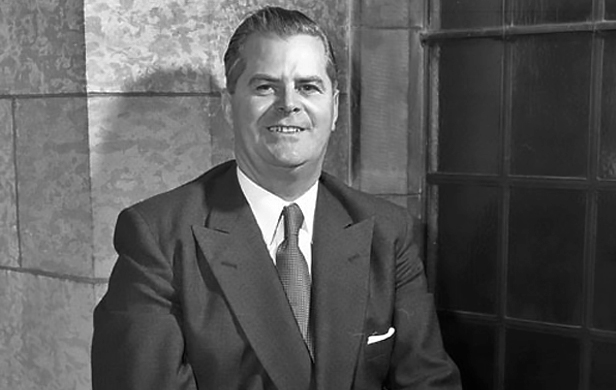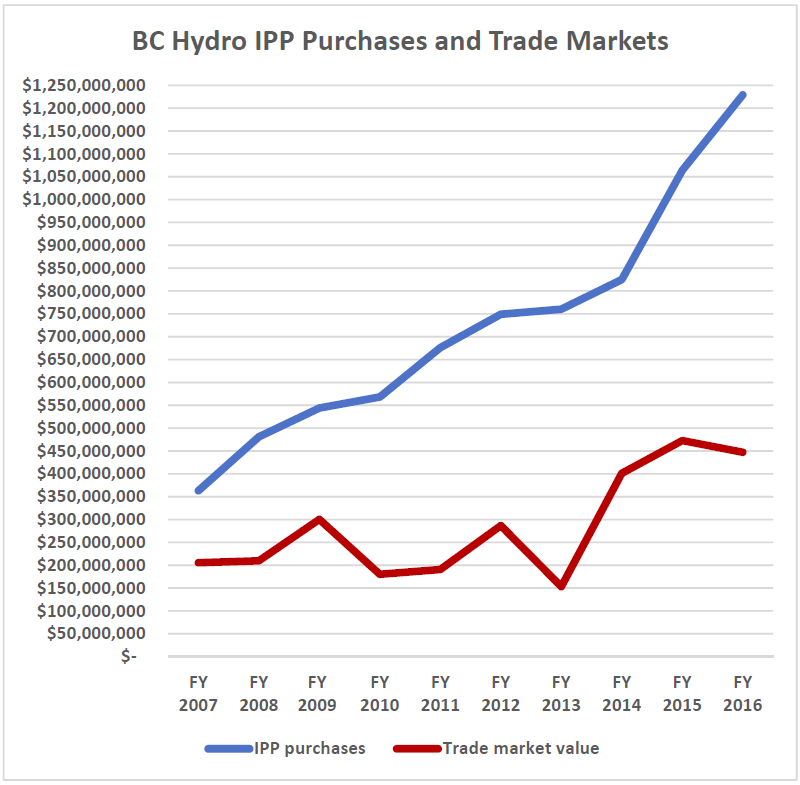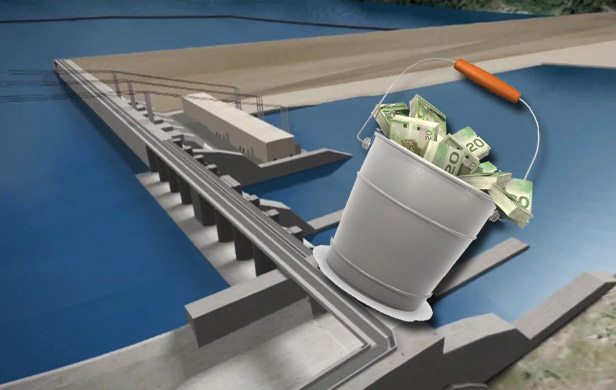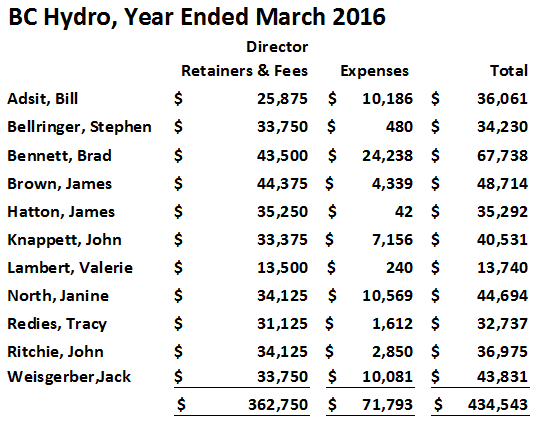
By Norm Farrell
Until the mid-twentieth century, much of British Columbia lacked reliable and affordable electricity. To resolve the privation, W.A.C. Bennett created BC Hydro, a publicly owned utility. The province’s leader acted because the private sector had refused to meet growing needs for electricity. Unlike less effective successors, Premier Bennett was a pragmatist, not an ideologue.

Existing power producers focused on profitable services in the southwest but Bennett had a province-wide vision. His was an audacious plan, but appropriate and successful. BC Hydro became indispensable to the growth and wealth of British Columbia. However, success sowed seeds of destruction.
BC Hydro’s profitability and financial strength guaranteed corporate raiders would attack, seeking to convert public wealth to private. To be successful, they needed cooperation of modern political rulers and, whether explained by incompetence, philosophical bent or desire for covert rewards, the Liberals cooperated fully.
Looting Bennett’s Legacy
Ironically, among today’s political facilitators of the utility’s destruction is W.A.C. Bennett’s grandson, BC Hydro Chair Brad Bennett, a Liberal apparatchik and close Christy Clark pal. Another is Hydro CEO Jessica McDonald. She was Deputy Minister and confidant to Gordon Campbell in 2006 when the premier’s office invited predators to get rich on electricity. (Blogger Alison Creekside named lucky BC Liberal operatives and allies in her article Gordon Campbell’s Big Jobs.)
A decade ago, Citizens for Public Power member and SFU professor John Calvert wrote:
[quote]B.C. Hydro announced the outcome of its 2006 tender call for electricity from private energy developers. The results were startling. Not only had B.C. Hydro agreed to buy three times the power requested in the tender, it had done so at locked-in prices far above projected market rates.
…The core of that policy was laid out in the 2002 Energy Plan, which prevents B.C. Hydro from building new generation assets, and transforms the Crown corporation from a generator of publicly-owned electricity to a purchaser of energy from the private sector.
The rationale for this change is hard to fathom. The old policy worked very well. By generating its own power, B.C. Hydro ensured that ratepayers enjoyed, on average, the second lowest electricity prices in North America. This is because prices were based on the historic cost of production, not the current energy market price…[/quote]
Dr. Calvert’s warnings were insufficient and subsequent Liberal actions even more egregious. The professor noted early independent power producer (IPP) contracts locked BC Hydro (and BC taxpayers) into financial commitments of up to 40 years. Recently, contracts have extended to 60 years and all are indexed to protect suppliers against inflation. Some required large public expenditures for distribution. Calvert said IPP prices were double the market value but they’ve since risen to even more.
IPP costs explode under Clark
We also know that, instead of costing between $400 million and $500 million every year, IPP payments have climbed beyond $1.3 billion yearly, a number that has increased 188% since 2011 when Christy Clark was appointed Premier.

Chronically overestimating demand
BC Hydro’s encompassing blunder was failure to recognize technology and market changes revolutionizing the energy industry. Hoping to grow their fiefdoms and deliver value to demanding friends, Hydro executives chose to ignore reality. They steadily issued demand forecasts predicting immense growth. (“If a boy holds a hammer, everything needs pounding.”) Meanwhile, consumers were conserving.
Here’s how badly they’ve gotten it wrong:
- In 1994, they predicted 52% demand growth by 2004. Actual growth: 18%
- In 2005, they predicted 20% demand growth by 2016. Actual growth: 0%
- In 2011, they predicted 20% demand growth by 2016. Actual growth: 1%
- In 2012, they revised to 9% demand growth by 2016. Actual growth: -1%
Indeed, the utility’s records reveal that electricity consumption by regular customers has been flat for more than a decade.

IPPs get rich on ratepayers’ backs
Despite all the above, over the past decade, amounts paid to IPPs have tripled. Independent power producers more than doubled deliveries to BC Hydro and the utility was forced to dump surplus power outside the province, with trades sales at an average, since 2005, of just 28% of prices paid private producers. And that loss is made worse because of Hydro’s collection and distribution costs.
 So, for every dollar we pay them, we lose more than 72 cents.
So, for every dollar we pay them, we lose more than 72 cents.
Consumer demand was not growing, private power supplies were rising and export markets were soft. BC Hydro could only dump power outside the province for little revenue or reduce its internal production. Again, the utility’s own reports lead to a conclusion.
The following numbers are drawn from BC Hydro’s annual and quarterly reports and from U.S. Department of Energy market recaps. They demonstrate that in nine months, BC Hydro paid more than $600 million above market to independent power producers – having purchased the power from IPPs at $85,261/GWh, while the market for selling electricity to the US market was just $28,930 CAD per unit. Unfortunately, the rate of loss is accelerating.


Liberals pulling Hydro’s puppet strings
The Liberal Premier and cabinet failed catastrophically when they directed BC Hydro to contract for private power the utility did not need at prices it could not afford. The extent of this gross mismanagement, unprecedented and ruinous for the crown corporation, remains concealed by government-friendly media that is enjoying millions of public funds spent on advertising and public relations.
The Liberal decision to exercise absolute control over BC Hydro’s management was made clear in 2008. CEO Bob Elton, a qualified professional, was fired by Gordon Campbell after stating publicly, “Conservation is the cleanest, easiest and least expensive way to meet the increasing demand for electricity in B.C. – it’s like building a virtual dam.”
Reducing consumption of electricity simply did not fit with the Liberal gang’s desire to buy private power from their pals for tens of billions of dollars.
The goose that lays the golden egg
More recent opponents of Liberal power policy assume that, beyond grabbing the profits to be made flipping IPP contracts, political operatives aimed to cripple BC Hydro to make its privatization palatable. The writer believes that, while this was the initial plan, the guiding parties decided they could gain more another way.
There was no need to privatize Hydro’s assets and liabilities. Instead, they privatized its profits and left Hydro and the public with all the financial risks.
One example is Site C, which will create more unneeded and unaffordable power. No private investors in the world would fund a hydroelectric dam with environmental issues, First Nations conflicts and near zero prospects of profitable operations. But, if the public pays for the dam and sells power to the private sector at a fraction of cost, there are private profits to be made.

Budgeted at $8.8 billion, if spending on Site C matches other Liberal megaprojects, it will cost substantially more. That money goes straight into the pockets of big construction companies who have donated heavily to the Liberal Party. Far from caring about keeping the project on budget, they have a huge incentive to see that it goes over.
In addition, there are indicators the dam’s output will be less than forecast. In 2011 through 2016, BC Hydro’s three largest facilities annually produced 3.6 times stated capacities. Proponents claim that Site C, with 1,100 MWh capacity will produce 5,100 GWh. That is a ratio of 4.6, considerably above Hydro’s typical experience. Reduced production will mean higher costs for each unit of power the dam generates.
That should set off alarms for residents and small businesses operators. BC Liberal policy enables heavy industries to pay well below the average cost of new power so residents, commercial enterprises and light industry are the utility’s only profit producing customers. High production costs for private power and Site C output and weak export markets make significantly higher domestic prices inevitable.
Liberal donors control Hydro board
 Clearly, BC Hydro has been in disarray for some time. In fact, it is operating as an affiliate of the BC Liberal Party. Of the eleven people collecting fees as directors of the province’s utility in the last fiscal year, all have records as party contributors or close associates of Liberal politicians. Some have business dealings impacted by business activities of BC Hydro.
Clearly, BC Hydro has been in disarray for some time. In fact, it is operating as an affiliate of the BC Liberal Party. Of the eleven people collecting fees as directors of the province’s utility in the last fiscal year, all have records as party contributors or close associates of Liberal politicians. Some have business dealings impacted by business activities of BC Hydro.
Political meddling, moronic contracts, deceptive accounting and the self-serving management of mediocre hacks devastated what was once a competent and professional crown corporation. Not by accident or mere negligence, this was deliberate.
Recovery will not be simple or quick but, if it is to happen at all, a new beginning starts with the provincial election on May 9.
Note: Site C’s output was originally stated as 1,100 GW, which has been corrected to 1,100 MW.
Norm Farrell is a longtime blogger and published of IN-SIGHTS.


IF ANYONE EVER TRIES TO DEFEND THE BC LIBERAL PARTY OR IF THEY EVER TRY TO DEFEND THEMSELVES BY ATTACKING THE NDP OR THE GREENS, READ THIS ARTICLE AND THROW THE LIBERALS DECEITS AND LIES RIGHT BACK AT THEM! This article/expose on BC HYDRO should make every taxpayer in BC absolutely sick to their stomachs by the Liberal deceit. There were rumours of the problems with HYDRO but this article/expose shows the extent to which we, the public, were lied to. The cost to taxpayers for the next 40 – 60 years will continue to climb while independent power producers will reap the profits at the taxpayers expense…..due to the BC Liberal governments theft from HYDRO.
Read this article/expose and it is clear that there is now and never has been, a reason for the SITE C DAM and that NDP and GREENS are right to call for an absolute and immediate stop to the project which will only further enlarge the IPP profits and further indebt the next couple of generations of taxpayers with unsustainable increases for the cost of HYDRO.
It’s no wonder that the Pay to Play plan of the BC Liberal Party was so successful and that the donor list read like a who’s who of the 1% and foreign entities investments in having the BC Liberals continue down this path of taxpayers paying for corporate profits.
One word: DISGUSTING.
“The goose that lays the golden egg:
More recent opponents of Liberal power policy assume that, beyond grabbing the profits to be made flipping IPP contracts, political operatives aimed to cripple BC Hydro to make its privatization palatable. The writer believes that, while this was the initial plan, the guiding parties decided they could gain more another way.
There was no need to privatize Hydro’s assets and liabilities. Instead, they privatized its profits and left Hydro and the public with all the financial risks.
One example is Site C, which will create more unneeded and unaffordable power. No private investors in the world would fund a hydroelectric dam with environmental issues, First Nations conflicts and near zero prospects of profitable operations. But, if the public pays for the dam and sells power to the private sector at a fraction of cost, there are private profits to be made.”
Here is why articles like this are never going to be taken seriously.
So in 22 years they predicted wrong 4 times. Seems pretty awesome to me considering it’s a guesstimate anyway.
If they are so terrible, why not list the remaining years from 1994-2016 so we can decide for ourselves? Clearly you have the data somewhere.
Why not provide a link to your sources?
I want to believe you, but it seems like classic cherry picking your data, making the whole article easy to disregard.
In 1994, they predicted 52% demand growth by 2004. Actual growth: 18%
In 2005, they predicted 20% demand growth by 2016. Actual growth: 0%
In 2011, they predicted 20% demand growth by 2016. Actual growth: 1%
In 2012, they revised to 9% demand growth by 2016. Actual growth: -1%
Yanni, those are years the “guesstimates” were made by Hydro. They don’t make these big forward-looking predictions every year. So it’s wrong to interpret this as them being right 16 out of 20 years. In fact, they have never been right. And the amount they’re off is unacceptable. The problem is that the act of predicting future demand has become a political one, not a scientific one.
I don’t care about all the yearly data. The BC Liberals are sucking money out of BC Hydro. Like they’ve done with ICBC. Crooks, dishonest pieces of crap.
Triple AAA credit rating with the lenders who gave the thieves on Wail Street the same ratings. It’s BS. They have sold BC and have personally profited.
Robbery comes in many forms, Sometimes breaking contracts and getting out is the only way to cut your losses.
A reflection of the BC Government and BC Hydro financial abuse of the provincial population is captured by the annual reports of the Comptroller General and the Auditor General. In the period from 2007 to 2016 the total liabilities of the Province increased eight times faster than the total revenues for the Province. On a simple average, revenues increased each year by about $.9 billion while total liabilities increased annually at a little more than$8 billion. Liability numbers can be found in the section produced and signed off by the Comptroller General and ,secondly, in the section produced by the Auditor General. To see these last set of liability numbers you must go to the “footnotes” and the one titled “Contingencies and contractual obligations” . So there is no misunderstanding, the former Auditor General, John Doyle, was asked in writing and confirmed in kind that the total of “Contingencies and contractual obligations” did represent a double-counting of provincial liabilities.
In aviation circles that would be called a “coffin corner” where the pilot has run out of altitude and flying speed at the same time. With respect to the financials of the Province I call our current condition a financial “coffin corner”. Selling assets at distressed prices and/or living less well seems to be inevitable. The lions share of our total liabilities are due to IPP contracts . The absence of enough revenue growth is because the global economy is in a slump and we are transitioning from 20th century economies to 21st ones that are still evolving. The future for the BC population does not rest on building hydro electric dams but in the education of the population, something our premier does not understand or cares to.
Correction:
Toward the end, the statement ‘Proponents claim that Site C, with 1,100 GWh capacity will produce 5,100 GWh.”
should read
“Proponents claim that Site C, with 1,100 MWs capacity will annually produce 5,100 GWh.”
Are we really beyond the point of no return in expecting honesty from politicians? Bribes in the form of political donations should be illegal. The role of a lobbyist is to make sure a politician has information regarding the lobbyist’s client, not buying favours with money exchanged for the benefit of the politician. Politician’s role is to look out for the common good of the citizenry, not to be swayed with bribes. The common good is arguable as to economics and environment. Environment has to dominate, otherwise the place will become uninhabitable where jobs are meaningless because we can no longer live here. Politicians cannot become obligated to corporations as compared to the People. This then will question the intelligence of the voters. Will they be able to see past the advertising and false info about issues? Thanks Norm for your research, and to Rafe for exposure.
provincal government destroys bc hydro financially on purpose so they can sell it to their super rich buddies: they are giving our beautiful water away to any corporate entitiy that wants it. Nestle gets 1000,000 liters for about $2.00 a liter. out of Hope bc.. they sure look after their buddies… Doesn’t Nestle Hydro sound like music to your ears.
cancel the word liter after $2.00 in above comment
what a silly unthoughtful reply.
Hiding under the blankets in her office and hoping nobody asks for her is attorney general Susanna Anton. She has an obligation to investigate and if need to be a prosecute people against whom there is a prima facie case of crime. This becomes very awkward when the person under scrutiny is a colleague or perhaps even a group of colleagues.
That awkwardness, far from minimizing the obligation, strengthens it because it becomes, in addition to a lagal obligation, a matter of honour. If the attorney general under those circumstances lacks the courage to carry out the position of chief legal advisor to her Majesty, he/she should step down,
Ms. Anton has shown a remarkable disinterest in the BC Hydro case although as Damien has pointed out the facts now being flushed out by Norman Farrell were apparent at least 10 years ago and a number of us including Mr. Farrell were exposing them to the public whenever we could. I have to assume that Ms. Anton can read and that being the case had plenty of evidence back then to instruct Crown counsel to look further at the energy policy her government had passed which developed into the giant fraud that Mr Farrell is now courageously exposing.
Why didn’t Ms. Anton appoint Crown counsel? As the giant fiddle unfolded it certainly was a well known fact and easily demonstrated that the Hydro electric power formerly being generated by BC Hydro was now being generated by independent power producers, IPP’s, on outeageous terms and who had a remarkably close association with the government, especially when it came to making corporate donations to the Liberal party.
Had Ms. Miss Anton acted them or indeed anytime up until the last four or five years she would have saved the province billions of dollars and kept BC Hydro out of bankruptcy.
I would like to find an innocent reason for Ms. Anton’s unseemly reluctance but quite frankly I cannot. I only suggested to her that in the absence of a good reason, it must be assumed that she showed bias and prejudice in favour of the premier and government with whom she sits in cabinet. If I am wrong on that then, of course, I would apologize unreservedly, but first I have to have an explanation that makes more sense.
It’s far from easy for an attorney general to appoint Crown counsel or prosecute a colleague with whom he/she is a cabinet colleague but it has to happen sometimes. In fact it did happen when I was in government and the attorney general, Mr. Garde Gardom, had to advise premier Bill Bennett that there was a prima facie case of fraud against a member of cabinet. When the premier received the advice he promptly demanded the resignation of the minister and when he refused Mr Bennett went into the legislature where I happened to be sitting, and advised the Speaker that this person was no longer a member of Her Majesty’s Council. It was extremely unpleasant not to mention embarrassing for everyone; it required courage on behalf of Mr. Gardom who could have delayed and obfuscated but he didn’t, because he knew and understood what the attorney generals obligation was and fulfilled it however unpleasant it was.
The evidence now flushed out by Norman Farrell is so compelling that one has to conclude that Crown counsel should have been involved long ago. That still has not happened and to the best of my knowledge neither has any statement from Ms. Anton on the matter been made.
Probably this is part of the general breaking down of parliamentary tradition over the last 15 years, starting with Premier Campbell imposing no penalty on himself when he was thrown in jail for drunk driving. Looking back, that was the message that the high standards of old were now abandoned. This, however, goes a little further because Ms. Anton still has a legal obligation which in my opinion, she’s simply not fulfilling and must either do so or give a substantial reason why she won’t. Otherwise she must stand down.
BCHYDRO should reduce capacity on its own plants until the surplus supply is reduced sufficiently to cover the costs. As long as prices are low Hydro should be buying from the exchange to offset the contract prices with IPP .
That’s not the point, Dennis. The power we create from our legacy assets like Bennett and Revelstoke dams comes at a comparable, affordable price to what’s available on Mid-C exchange. Ramping down these dams to make room for IPPs makes no sense. The problem is our obligation to buy IPP power at these ridiculous rates in the first place – power we never needed, which is what people like myself and Rafe Mair argued back when these contracts were on the table in the 2000s.
The reason we don’t need them isn’t just the fact that we’re a net exporter of power – it’s the fact that much of this power comes during the Spring run-off, which is the worst possible time of year, especially given that it can’t be stored long-term. It’s a terrible because it coincides with our highest supply from our legacy dams and our lowest annual demand (in Spring, we’re past heating our homes much, and not yet cooling them). For these reasons, this is and always was a scam foisted on unsuspecting ratepayers and taxpayers. All of the Liberal Government’s making.
I was originally going to leave some broad hinting about the company G. Campbell was keeping the day that the Clean Energy Act went into effect, as minor correction of your assertion that the bulk of the money for the site C project was going to domestic donors for our current Infernal government (I have heard some interesting theories that seem plausible about a much deeper and uglier picture than even CSC/Desmog, etc have been painting), however aside from the preceding, I am intrigued by the matter of the Spring run-off that you mention.
Is there any industrial process that would allow for a seasonal spike in available power to be utilized so as to be worthwhile stockpiling, storing, and/or transporting a material resource over the course of the rest of the year?
Rio Toro has the market for aluminum smelting in Northern BC pretty well handled (with the added issue of pollutants/side products of the Al processing), but one has to wonder if there has ever been a feasibility study done on large scale electrolysis of sea water to produce clean hydrogen, etc.
One of the prime drivers behind public support for the Site C dam has been low employment in the North, which somehow in people’s minds is significantly alleviated by a 1,000 jobs or so that are well over a quarter of a million dollars of tax/ratepayer’s money each if the people obtaining those position are looked at as the primary beneficiaries, but the landscape could change significantly on the political and social level if there were at least the option of moderate to high income seasonal work available.
The issue of why people poorly suited across the board for the environment that they inhabit, feel entitled to have work provided for them so that they don’t have to move away from land that by the ancient law that originally “established” the presence of the Crown in Western North America.
There is little rational about the dam project from a broad take on the costs, yet it is still absurd that there are people consciously choosing to work for the project itself. If there is any sincere love for the land and territories that they occupy, and a desire to establish a continuity of generations upon the same, one would expect them to actually be defending their food security, etc.
Hello Darryl;
Can you give me details of the company G. Campbell was keeping when the Clean Energy Act was passed? Thanks.
Hi Darryl, The big dams can store water, therefore spread out use over the seasons – they are, in effect, massive batteries. These smaller private river power operations can’t really do that because their “head ponds” are too small. Of course, you could store some power in batteries and strides are being made with that technology, but not, to my knowledge, to the point where you could efficiently set aside large quantities of IPP power for when we really need it. This was one of our main arguments against the program from the beginning…PS with regard to your other point, some of these companies, like KPMG, SNC-Lavalin, Peter Kiewett, etc. are massive multinationals, so, if I understand the point you’re hinting at, I agree that not all these billions are being funneled to local party donors; although many of these bigger multinationals are giving lots of cash to the Libs…I’d be happy to hear more specific assertions if you’re interested in sharing
a good comment. cheers.
Very curious about the jobs supposedly to go to Northern Workers. I was under the impression that jobs on Site C are reserved for those willing to work without any representation to protect them in regards to wages, conditions, safety, health, security, etc.
Most of BC Hydro’s costs are fixed and continue, whether power is generated or not.
The predicament we now face as citizens of BC is that Liberals have tied our hands for decades to come. Those many IPP contracts last for decades. (Some until 2075) and, while we are not allowed to see these contracts (worth a total of about $75 billion), we know some include take or pay clauses.
it seems the Liberals and their friends ensured the contracts would continue beyond any change in ruling party, without regard to demand for power or market value. It is commercial fraud unprecedented in BC history.
Even worse, it is a subject the captive corporate media won’t report.
Christie and her lyin’ libs are currently involved in the biggest fraud in the history of the province — years of dissecting bc hydro into pieces, and passing the high profit parts, one by one, to backroom connections, has been the norm for a decade., Now, Site C alone will be a $14,000,000,000 (yes, thats 14 billon) transfer, to connected corporate ceo’s, and will take us 75 to 90 years of insanely increasing hydro rates to pay for. Possibly the worst part of this, is that the purpose of the electricity from site C, is to subsidize the foreign profiteering on fracked methane, poisoning our entire water supply. It also is destroying the best remaining farmland in bc, at a time when food import sources are about to dry up, with all cost ptojections showing huge increases for food costs in bc, and shortages.
NDP can actually be elected, and will re-open the fraudulent site C approvals.
Pressure needs to be exerted upon Horgan in advance of the election proper to commit to full and open consideration of the findings overlooked and ignored by the incumbent party, and possibly to do some “house cleaning” of the un-elected body politic and administration at the level of the Legislature, or we will be risking the classic trope of the “nice government” getting in, and absorption of the patterns of corruption, fiscal nepotism, and all around infectious devolution of the apparatus of British Columbian governance.
Yes 14 billion for a power source to supply a fantasy industry called LNG.
Not one LNG plant in BC not one FID signed and not one shovel in the ground.
Don’t forget the imaginary prosperity fund. Roses,hearts, and sparkle ponies everywhere….
Someone needs to establish a Commission of Public Inquiry into this apparent travesty of justice. Norm Farrell, interested?
Good work, by the way.
A.G.
We need complete dedication to openness and transparency, which means true freedom of information that is complete and timely. Sunshine laws and independent oversight can ensure better government. However, citizens must demand ethical behaviour from politicians. I believe that BC has reached the point where corruption has become commonplace in provincial business. That should be unacceptable.
It should be ILLEGAL!
I own and run an IPP. I get 9.99 cents per kWh from BC hydro netmeeting. This is non index linked. Under the larger SOP agreement the rate is index linked at 8 cents. My friend has a larger IPP and he sells to BC hydro powerX. He gets between 2.5 cents to 4 cents.
I wish I could get the suggested 85 cents per kWh that you seem to think we get.
Can you tell me under which agreements this rate is offered, I can not find anything on BC hydro’s web site.
-Alex
Which IPP is it that you own? Just to be clear, we’re talking large scale private river power projects here.
The 8.5¢ a Kwh is the average calculated by dividing the total amounts paid all IPPs by the number of gigawatt hours delivered by the private producers. Not all private operations get the same treatment. I interviewed one operator near Slocan Lake who insists that BC Hydro refuses give him a contract at anything approaching the average they pay others. His facility, built in the 19th century, uses little water but drops it a long distance to generate power. He says his business is being bankrupted by BC Hydro and they will only pay him a “junk power” rate that is closer to 1¢ than the 8.5¢ per KWh. He paid for transmission lines to the intertie point but BCH won’t pay a fair price even though it can be delivered into the existing grid.
This, I’m afraid, is how business is done in BC. If you paid the right people the right amount, you can do business with government. If not, you’re out of luck.
https://www.youtube.com/watch?v=fKqKSWDtyMk
(Edited, please use this one…)
Yet we have the slightly less-ancient power plant at Woodfibre that is pulling in almost $2 million a year in IPP payments from BC Hydro. It was built in 1947, to power the pulp mill, then orphaned when the mill was closed down.
Hydro could have said, “We’ll do you a favour and pay you the market rate” — but they seem to have gotten a sweetheart deal. (To be fair, it’s a dammed IPP, so has the ability to make power continuously, rather than just in the spring.
http://www.squamishchief.com/news/local-news/back-in-time-at-woodfibre-1.2358712
I did some calculations and wrote a letter-to-the-editor here:
http://www.squamishchief.com/opinion/letters/letter-bc-hydro-paying-woodfibre-lng-too-much-1.2368791
Woodfibre seems to be getting a very sweet deal on their IPP. Even if they NEVER get the LNG plant going, their land purchase costs can certainly be covered by the IPP.
Hmmm interesting. I am guessing that your friend with the larger IPP had an older contract (there were a few IPPs negotiated under the NDP in the late 1990s + early 2000s) or had a contract that recently expired and was renegotiated at far closer to market rates.
Alex, if you are in the business, you ought to be able to accurately place decimal points. $85,261 per GWh equals 8.5¢ per KWh, not 85¢ per KWh.
Alex, you should be able to get that information with a Freedom Of Information request. I said ‘should’. I would not hold my breath however.
Can someone explain why or how the IPP costs have risen so steeply under Clark? Otherwise a really good article. A keeper!
They will continue to rise because the BC Hydro / IPP contracts have annual price adjustments.
As well, because more and more of the IPP projects are coming on stream.
It’s scandalous, that the BC Libs (and Hydro) haven’t put a moratorium on IPP development.
you can’t have corrupt politicians without a corrupt, complicit bought and paid for media and a population of which a majority could care less.
the filthy truth….
Gary, rather than a majority caring less it’s a majority not being educated. Where in the MSM do you find any of this information? You don’t. The average ratepayer is more concerned about paying the mortgage, taking the kids to hockey practice etc. rather than searching for stories about corrupt politicians. That’s what he hires police and courts to do. Unfortunately!
Most ratepayers do not subscribe to The Tyee or its contributors. Unfortunately.
And until they become wiser we will continue down this road to disaster.
Excellent article. Can you please site your data references?
BC HYDRO.
I have all BC Hydro annual reports and audited financials back to the 1970s and decades worth of quarterly reports as well as other documents issued by the utility. The numbers I use originated with BC Hydro and the financial numbers have largely been tested by the auditors, who are now KPMG.
This should certainly provide the NDP with enough incriminating evidence to make a difference on May 9th, 2017. It should also catch the eye of the BC Auditor….and the New York Times? More wild west BC. Thanks Norm.
This is one that should be kept on file for the next election. How the Christy and her band can claim any fiscal competence defies logic. What is wrong with the MSM and the Victoria Press Gallery? What another bunch of useless “journalists”. I can’t even bear to use the word.
I echo the endorsements of Norm’s article. For at least 8 or 10 years is was apparent ,when looking at the deliberate demand exaggerations and the secret IPP contracting, that BC Hydro was the target of the parasites that pop up when leaders show their willingness to “play the game”.
Many solid researchers of note have connected the dots for readers and they all hold with the idea that what has happened at BC Hydro was and still is deliberate. It has been the plan since 2003 to cannibalize BC Hydro for the benefit of the few at a cost to the many. A review of the financial vectors at BC Hydro show in stark reality that BC Hydro has taken direction from financial and/or economic illiterates. If the reader doesn’t buy that explanation then one is left with the prospect that what has happened is because of deliberate thievery.
Norm makes it clear that projections of demand have never been close to correct for more than a decade. This is not explainable by just being “slow learners”.
nothing say propa like taxpayer paid ads before an election.
Would like to see references for the facts & figures in this article.
This all comes directly from BC Hydro’s own figures and the Mid-C electrical exchange (where we buy and sell power through Washington State).
What a perfect dartboard!!!!
This coming from a party that calls itself superior fiscal managers. I believe that the new catch phrase ‘alternative facts’ will come into play here. However, their rhetoric will continue to rely heavily on lies.
Utterly heart-breaking. Where are the British Columbians on this?
Thank you for your hard work and dedication to this issue. Thank you Rafe and Norm. Follow you both on twitter as of today. It’s a pleasure!
I keep a folder containing articles and other information for discussion with any BC Liberal who knocks on my door asking for my vote come election time.
This will be printed and added to the folder.
Thank you, Rafe and Norm.
I tried holding a conversation when BC MLA Jane Thornthwaite (Liberal – North Vancouver-Seymour) knocked on my front door in the 2013 campaign. Talking proved impossible because she turned and fled immediately, disappearing down the driveway then down the street.
Her worst fear; a high-information voter.
Well done Norm.
Excellent comments.